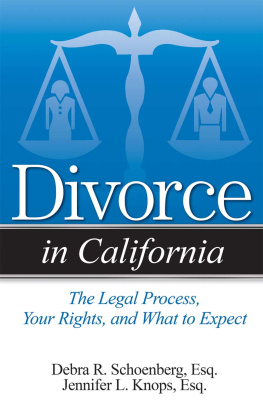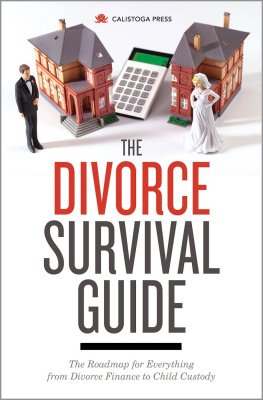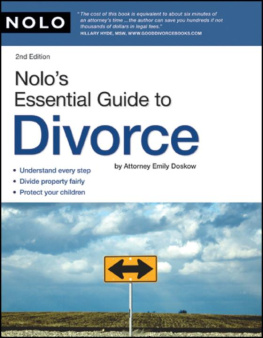1. Timing
Abstract
Breakups can be just as hard on the person who leaves as for the person who is left. But sometimes the emotional timing is different for each. The person who leaves may have been thinking about leaving for a long time, perhaps six months, a year, or longer. He has been trying out the separation in his head for a long time while still participating in the marriage for all outward appearances. He may already have one foot out the door. The other person may not know anything is wrong, and so the announcement comes as a complete surprise. This person then has some catching up to do emotionally. This chapter covers the issue of timing, focusing on financial, practical, and emotional issues, especially for those about to make a decision to separate or divorce.
Breakups can be just as hard on the person who leaves as for the person who is left. But sometimes the emotional timing is different for each. The person who leaves may have been thinking about leaving for a long time, perhaps six months, a year, or longer. He has been trying out the separation in his head for a long time while still participating in the marriage for all outward appearances. He may already have one foot out the door. The other person may not know anything is wrong, and so the announcement comes as a complete surprise. This person then has some catching up to do emotionally. This chapter covers the issue of timing, focusing on financial, practical, and emotional issues, especially for those about to make a decision to separate or divorce.
Practical Timing Considerations
Whether to stay or go is a hard decision to make. It can take a long time to decidesometimes years. It is not a frivolous or impulsive decision, and you want to get it right. Sometimes people come to a lawyers office and even pay a retainer before they have really decided to get a divorce. I call this the inquiry stage. It is OK to stay in the inquiry stage for a while.
But I also have people who come to my office after being together with their partners for 5 years, 15 years, or 25 years. They say they knew they wanted out years before.
Why didnt you leave? I ask.
Because I thought things would change.
People sometimes do change, but frequently they do not. Here are some things to think about if youre trying to decide whether you should stay or you should go:
Investment : Youve got a lot invested in your marriage in terms of time, effort, and cost. Is it time to cut your losses and move on? Or do you stay in the marriage and try to find a way to make it work?
Children : What will be the impact of a divorce on the children? Children are always better off in an intact marriage with two loving parents. But if there is constant bickering and fighting in the home, would they be better off if you and your spouse separated? A split may mean the children have to move to a new residence, a new neighborhood, and a new school. Many parents time the divorce so that the kids dont have to change schools in the middle of a school year. Sometimes spouses wait to get the divorce until the children are out of high school.
Companionship : Its lonely out there. Even though you may be unhappy living with your spouse, you may dislike being alone even more. Doing things alone, like eating, watching television, or sleeping, can make you feel very lonely. But you can also be lonely in a dysfunctional marriage.
Familiarity : Have you heard the saying The devil you know is better than the devil you dont know? Some people keep repeating familiar habits after getting a divorce and pick the same kind of partner they just got rid of.
Dating : Do you really want to enter the dating pool again? If you have been out of circulation for a while, the dating scene can be awkward and uncomfortable. You are older now. You may have children to deal with. You probably have more responsibilities and that can make dating more difficult.
Finances : Two can live as cheaply as one, but not when they are supporting two separate households. The money available for one household is typically not enough to support two. Somethings got to give, and usually its the lifestyle of both spouses. Before you decide to divorce, make a budget and see if there is enough money for both partners to survive.
States Matter: Where to Divorce If You Have a Choice
Only the state courts can grant divorces. The state where you should go to court to get divorced is the one where you live at the time of divorce, not the one where you got married.
In the event that you and your spouse are separated and live in different states at the time of divorce, you may be able to file in either the state where you live or the state where your spouse lives.
Every state has different laws, passed by their legislatures, that govern marriage and divorce. When you look around for the best place to bring a legal action, it is called forum shopping . Although the term may have a negative connotation in some contexts, it is perfectly legal in divorce. If you have a choice, it may pay to do a little forum shopping in your case.
For example, in Maryland, you must be separated for a year before you can file for a divorce, but in Virginia and DC, the time of separation required is only six months. So, if you live in Maryland and are in a hurry to get divorced, you can move to DC and file for a divorce there.
However, if you have children, child support is required until age 18 (and in some cases 19) in Maryland and Virginia, but it is until age 21 in DC. That could mean your ex can sue you for your childrens college expenses if you get divorced in DC.
And if you have acquired property or the worth of your property has appreciated after your separation, you will want to get divorced in Virginia. The court determines the value of your property according to what it was at the time of your separation in Virginia but calculates according to the trial date in Maryland and DC.
Tip
Consider your options when filing for divorce. Filing in one state vs. another can sometimes be to your advantage.
Employment: Why Its Best If Your Spouse Is Employed
Without a prenuptial agreement, when you get married you are entering into a contract that you havent read and dont understand. Its a contract that has provisions contained in the code of law of your state, and the interpretation of that law is done by the appellate judges, whose opinions are written in books known as reporters.
Part of that contract says that you have to support your spouse and children during the marriage. Furthermore, if you get divorced, you will have to continue to support your children. You may also have to support a spouse who is not yet self-supporting.
If you will be in need of child support and alimony, then you want your spouse to be employed so as to have the ability to pay these expenses. Despite this, many spouses are so angry at their partners that they are eager to make complaints to their spouses employer, the IRS, or the police. Before you do that, remember that a spouse thats fired or in jail cannot pay support.
If you are the breadwinner of the family, the amount of child support and alimony you are responsible for may be affected by the amount of money your spouse earns or is capable of earning. Obviously, its better for you if your spouse earns a good income. This will improve the chances that you wont get hit with excessive alimony payments.


















